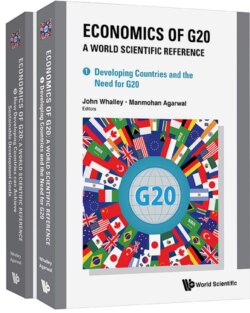Читать книгу Economics of G20 - Группа авторов - Страница 38
На сайте Литреса книга снята с продажи.
Declarations of Purpose and Intent
ОглавлениеThe Seoul summit in November 2010 contained a declaration in the agenda to discuss development and the summit resulted in the formation of Seoul Development Consensus for Shared Growth (SDCSG) and the Seoul Action Plan on Development (APD). The communiqué from the summit reiterates the leaders’ intent to deliver on the promise of the FSSBG, and in the next paragraph, para 5, the communiqué goes on to state that achieving the SSBG includes ensuring accelerated growth in LICs.
The SDCSG and APD are based on the following six core principles:
(1)Provision of Official Development Assistance (ODA) as well as mobilisation of all other sources of financing remain essential to the development of most LICs.
(2)As there is no single formula for the success of development, developing countries must devise their own plans.
(3)Priority must be accorded to global or regional issues that call for collective actions.
(4)The private sector has a critical role to play.
(5)The G20 will complement the efforts of other actors and specialise in areas where it has “a comparative advantage or could add momentum”.
(6)The G20 will focus on removing important constraints to development.
The communiqué also states that “the Seoul Development Consensus for Shared Growth sets out our commitment to work with other developing countries and LICs, in particular, to help them build capacity to achieve and maximize their growth potential, thereby contributing to global rebalancing”. Narrowing the development gap and reducing poverty are considered integral to achieving the broader objectives of SSBG. The consensus identifies nine key pillars where action is needed to remove important constraints to resilient growth. These are infrastructure, human resource development, trade, private investment and job creation, food security, growth with resilience, financial inclusion, domestic resource mobilisation and knowledge sharing. The APD then provides for specific actions in these areas. For instance, in the area of infrastructure the APD calls on the Multilateral Development Banks (MDBs) to undertake a needs assessment and to develop action plans to rectify any shortcomings that were revealed in this process. The G20 also created a high-level panel to review the MDB plan and identify financing needs and sources. As part of the Seoul Action Plan, the accompanying summit document states that the FSSBG adopted at Pittsburgh aims to assess the collective implications of national policies on both global growth and development, which would suggest that development was always part of the Framework. The document then goes on to state that the Seoul APD seeks to deliver on all three objectives of the FSSBG. The leaders also proposed replenishments for the concessional lending facilities of the MDBs, but with no specific numbers, and also to increase technical support to LICs through the banks.
Communiqués from subsequent summits have reiterated the above points, usually laying particular emphasis on food security and investment in infrastructure. The necessity of creating meaningful and satisfying employment has been increasingly stressed. The leaders at the Cannes summit in the following year labelled development as “a key element of our agenda for global recovery and investment for future growth”. The Cannes summit committee also expanded the development agenda by emphasising green growth, but there is a view that the Cannes summit scaled back the broad development approach adopted at Seoul. The French presidency argued that these objectives were too many to achieve and so concentrated on infrastructure and food security. Furthermore, in the area of food security it stressed the need for better market information and the need to improve the working of the derivatives market for commodities, whereas the Seoul declaration had also sought action to raise production and productivity by advancing, among other actions, the efforts of the Consultative Group on International Agricultural Research (CGIAR) to foster innovation, agriculture investment and smallholder agriculture. They had invited further contributions from the Global Agriculture and Food Security Program and the UN Committee on World Food Security to enhance food security.
As mentioned earlier, subsequent summits have basically reiterated the need for providing food security and financing for infrastructure construction. At the Brisbane summit in 2014, the G20 countries committed themselves to raise growth by 2% by 2018.
